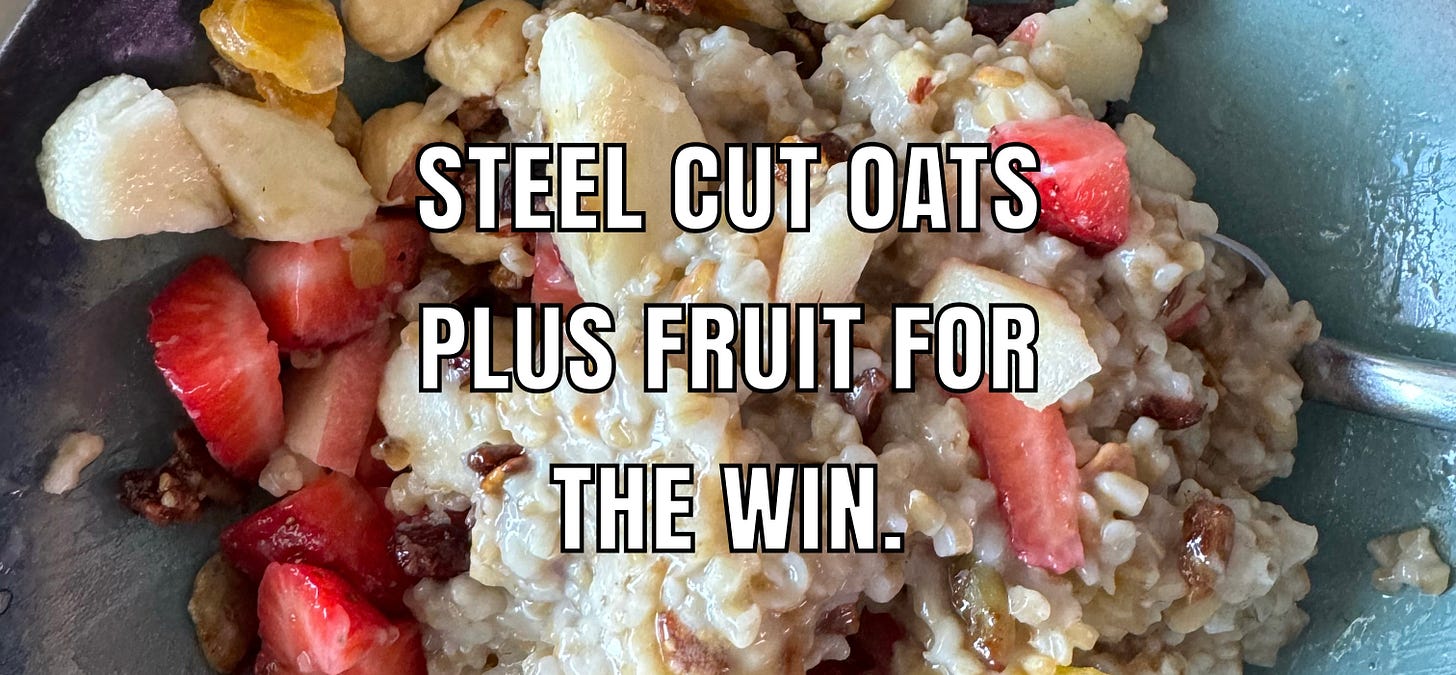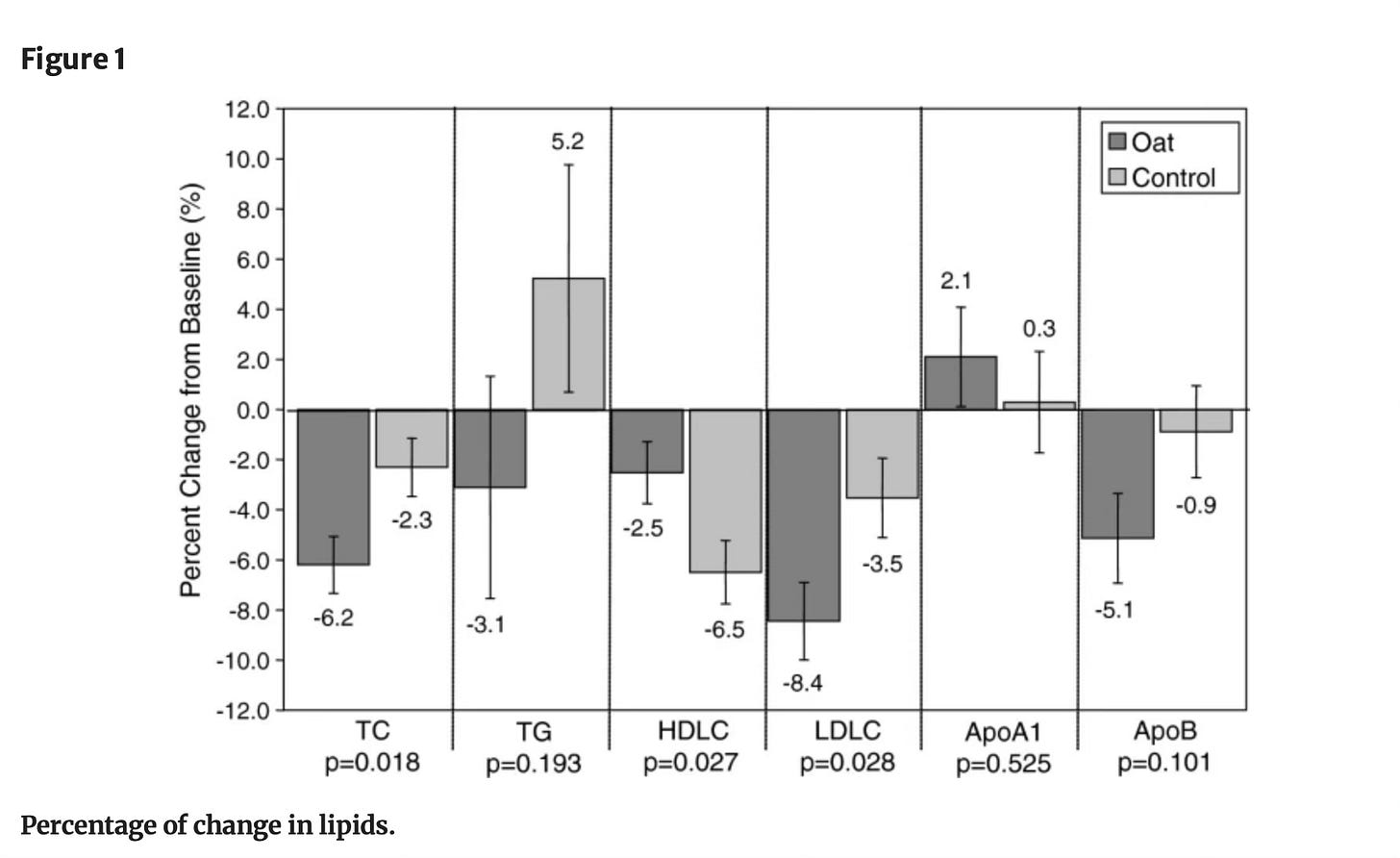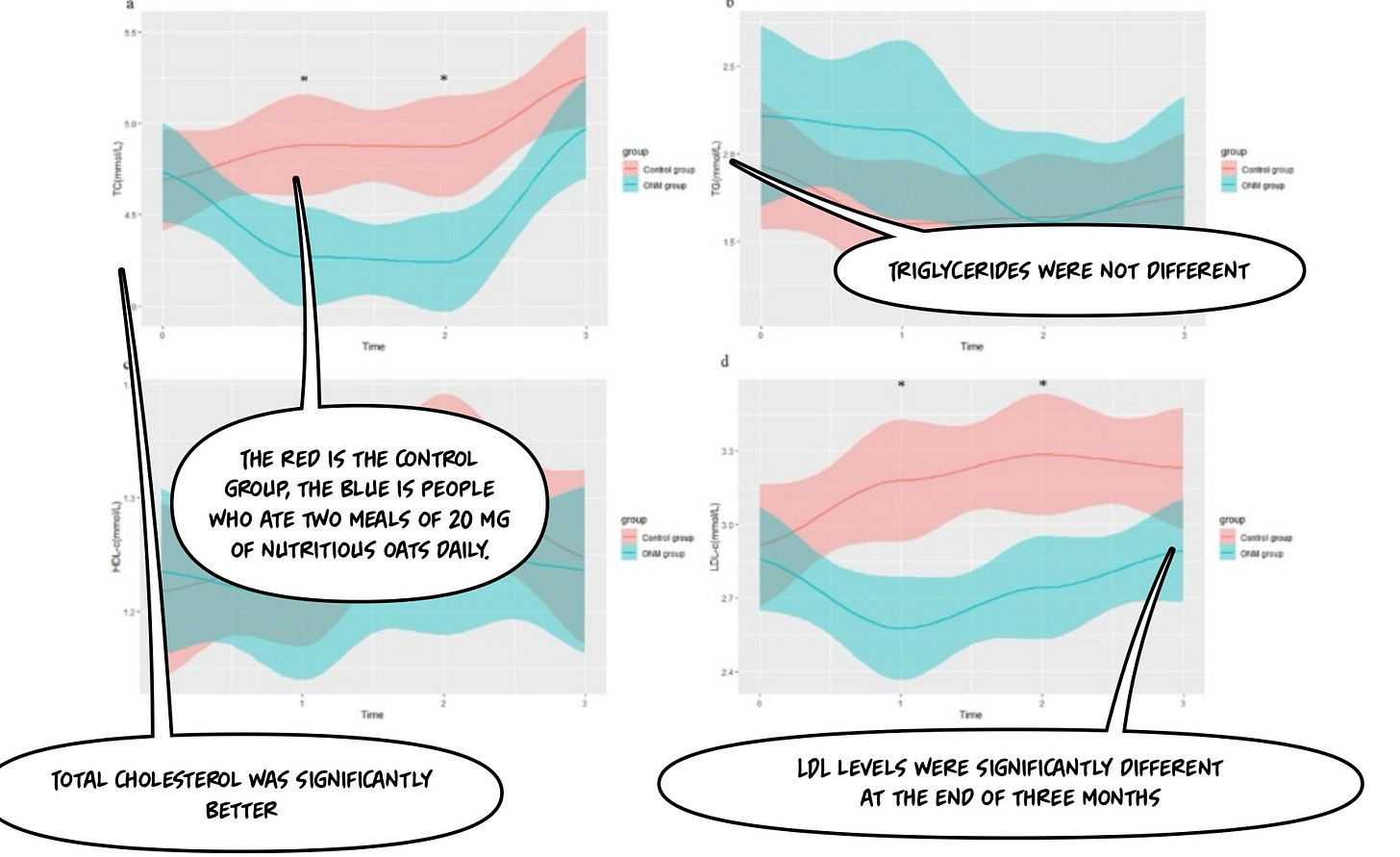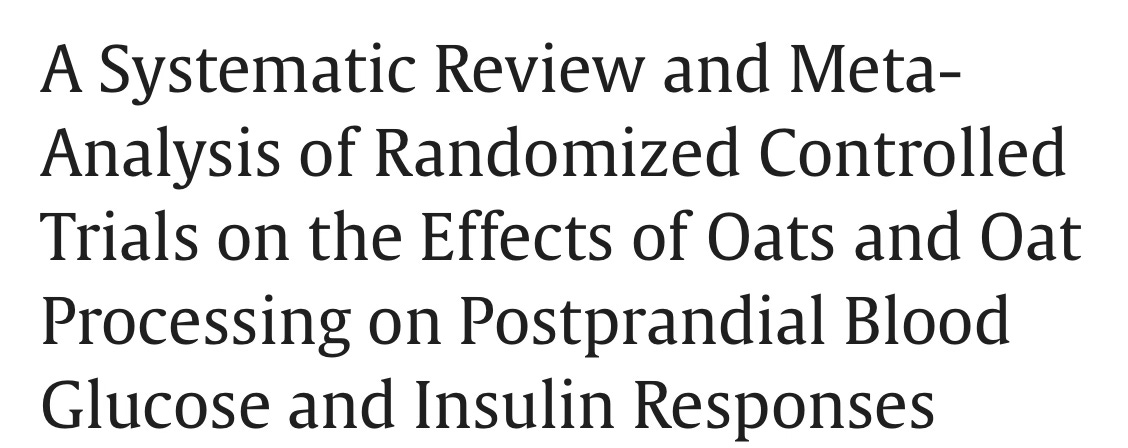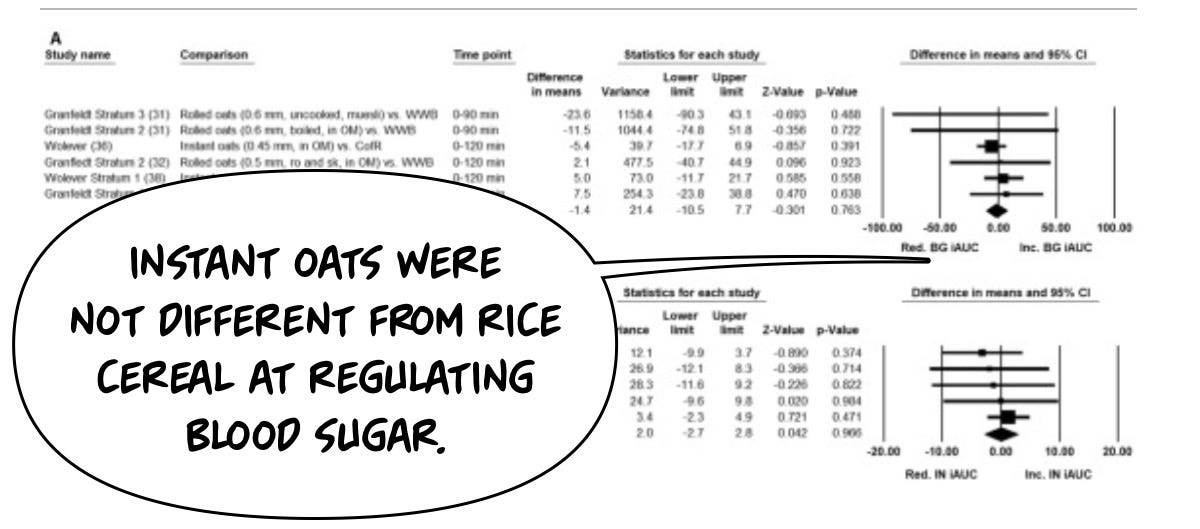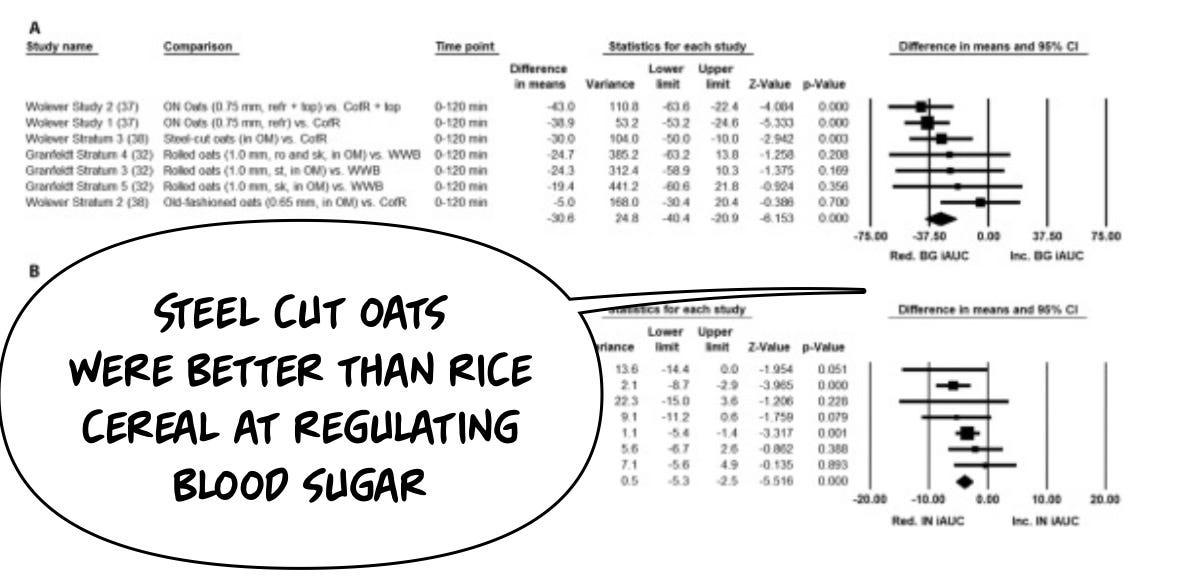Steel Cut Oats
An article about a plausibly healthy breakfast option
The Frontier Psychiatrists is a daily-enough Health-themed newsletter. This morning, I didn't have anything to write about. And necessity is the mother of invention. I decided I would need to have breakfast. You know, because it's the morning. This is what I ate:
And, like most of my more popular, I'm going to dig into the science and something I didn't think a lot about. Today, my topic is oatmeal. Not the dermatology oatmeal—that is a completely different evidence base.1
I decided I would have steel-cut oats. I'm also going to admit I didn't know what steel-cut oats were, I just knew they were slightly smaller than regular oatmeal, which is “healthy” according to data I haven’t looked at myself. I will start by outlining the various versions of Oats that can be ingested.
Per the Harvard Public Health School:
Oats, formally named Avena sativa, are a type of cereal grain from the Poaceaegrass family of plants. The grain refers specifically to the edible seeds of oat grass, which is what ends up in our breakfast bowls.
Oats are seeds of a grass. GOT IT.
Oats need to be processed in some way to eat. However, the degree of processing matters. Again, Harvard:
Although the nutritional content between steel-cut and instant oats is relatively similar, their effects on blood sugar are not. The least processed oats, like groats or steel-cut, generally take longer to digest so they have a lower glycemic index than rolled or instant oats.
The least processed are delightfully titled
Oat Groats: The whole oat kernels that have been cleaned, with only the loose, inedible hulls removed. Groats contain the intact germ, endosperm, and bran.
I’m so happy I used to teach MCAT. For general audiences, you can find-replace to “the whole damn oat” in your brain and move on.
The least processed oats we generally eat are referred to as “Steel Cut Oats”… because they are Oat Groats that have been…cut by steel blades.
These oats take a long time to cook, on the order of 30 minutes. They are also delicious, nutty, and given their high degree of soluble fiber, good for you, in popular parlance. Big Oats—like the Quaker Oats you recall from childhood, have one further step of processing:
Rolled or Old-Fashioned: Oat groats that have been steamed, rolled and flattened into flakes, and then dried to remove moisture so they are shelf-stable.
Not content with the shelf-stability and flakey nature of old-fashioned oats, yet more processing leads to the creation of the bastardized product that we refer to as instant oats.
Oat groats that are steamed for a longer period and rolled into thinner pieces so that they can absorb water easily and cook very quickly.
Of course, this is a great—said with sarcasm—opportunity to add sugar and artificial flavors to the oatmeal thus ruining the health benefits we might have experienced with the 30-minute cooing adventure that is the preparation of steel-cut oats.
Be aware that many brands of instant oats come sweetened or flavored, so be sure to check the ingredients for no added sugar.
Instant oats? They end up being pulverized and sugar-enhanced such that the “health benefits” are inverted—it’s like calling Soda “life-sustaining healthy hydration” because water itself is healthy.
It turns out that research on diet is often confounded. because Industry funds a large volume of dubious research. Research on the health benefits of food, or the health risks of other food, is overwhelmingly funded by companies which make money off of the foods. Some of these studies are massive, with large sample sizes, and one of those is the National Health and Nutritional Examination study…what an austere and completely appropriate name for what is in no way marketing material on the part of Big Oats:
Data from the 2001-2010 National Health and Nutrition Examination Survey were analyzed to assess the relationship between oatmeal consumption and nutrient intake, diet quality, and physiological measures in adults 19 years and older (n = 22,823). 2
This large study was funded by… You guessed it, big oats. OK, so maybe not big oats per se, but PepsiCo, which owns Quaker, is as close to big oats as we're going to get:
This project was funded by PepsiCo, Inc. YFC and MO are employees of Quaker Oats Center of Excellence, PepsiCo R & D, Inc, Barrington, IL, USA.
What kind of hypothesis might the Quaker Oats Center of Excellence put forward? One with limited commercial bias, I'm sure…oh, wait:
We hypothesized that oatmeal consumption is associated with a more favorable nutrient intake profile, better diet quality, and healthier physiological endpoints.
This content marketing in the format of a study made dubious choices. Because, of course, they did:
Oatmeal consumers (n = 1429) were defined as those who had consumed any amount of cooked oatmeal cereal during a 24-hour recall period.
Any amount of cooked oatmeal—which includes everything from steel cut to instant oats. In one regard, one could imagine that the inclusion of instant oats, which have deleterious effects on blood sugar, would bias the results in the direction of less observed health benefits.
They found a correlation between the tiny portion of people who ate oats with better health outcomes:
Our results show that oatmeal consumers were older than nonconsumers and more likely to be female; they also were less likely to smoke and consumed less alcohol. Consumers had higher intakes of protein, dietary fiber, vitamin A, thiamin, calcium, phosphorus, magnesium, iron, copper, selenium, and potassium and lower intakes of total, monounsaturated, and saturated fats; cholesterol; and vitamin B12. Oatmeal consumers had higher Healthy Eating Index-2010 scores and lower body weights, waist circumferences, and body mass indices.
So either oats are magic, or people who choose to eat oats (6%) of the sample also make other choices consistent with the above. The author’s conclusions, with “limited industry bias”…
To conclude, our results suggest that consuming oatmeal is consistent with better nutrient intakes and a higher diet quality.
Sigh. Ok. Fine.
My readers are, no doubt, asking themselves: “Has there been an RCT?” Well, there have been some. A paper from China randomized adults with high cholesterol to instant oatmeal vs wheat flour-based noodles.3 It led to improvements:
Another more intensive RCT randomized individuals with type 2 Diabetes or elevated blood glucose in the diabetic range to either oatmeal + diet or diet as usual. Again, these were instant-type oats, but without sugar added—no industry funding was disclosed. They had 2 Oatmeal doses a day for 3 months. Their outcomes were improved when it came to cholesterol4:
There are many more papers like this…my readers can guess what is coming.
Steel-cut oats are (likely) better for your health than instant oats with sugar added. It’s hard to eat oatmeal twice a day every day as a drug for your cholesterol problems. If you do, the outcomes are better. Either that is because Oats are healthy or because they displace less healthy other foods. Oh, wait, we have a meta-analysis5:
The authors meta-analyzed all of the studies on oatmeal, and subgrouped instant oatmeal vs thick (a.k.a. Steel-cut Oats). They then compared their impact on blood sugar, with the comparison group being rice cereal:
Instant Oats were no different from control:
Steel-cut oats were vastly better:
Steel-cut Oats: good for you. But in oats, as in life, there are no shortcuts. Except cutting the oats up with steel— that does help them cook a little bit faster. Instant oatmeal kind of sucks, and definitely sucks when you add sugar, but it may help regulate cholesterol if you eat a hell of a lot of it.
Thanks for reading.
Pazyar, N., Yaghoobi, R., Kazerouni, A., & Feily, A. (2012). Oatmeal in dermatology: a brief review. Indian Journal of Dermatology, Venereology and Leprology, 78, 142.
Fulgoni III, V. L., Chu, Y., O’Shea, M., Slavin, J. L., & DiRienzo, M. A. (2015). Oatmeal consumption is associated with better diet quality and lower body mass index in adults: the National Health and Nutrition Examination Survey (NHANES), 2001-2010. Nutrition research, 35(12), 1052-1059.
Zhang, J., Li, L., Song, P. et al. Randomized controlled trial of oatmeal consumption versus noodle consumption on blood lipids of urban Chinese adults with hypercholesterolemia. Nutr J 11, 54 (2012). https://doi.org/10.1186/1475-2891-11-54
Cai, X., Dang, Q., Liu, L., Ma, Z., Zhao, X., Zhang, M., ... & Yu, H. (2022). Oat nutritious meal has beneficial effect on lipid metabolism in type 2 diabetes mellitus: A 3-month randomized controlled trial. Journal of Functional Foods, 95, 105156.
Musa-Veloso, K., Noori, D., Venditti, C., Poon, T., Johnson, J., Harkness, L. S., ... & Chu, Y. (2021). A systematic review and meta-analysis of randomized controlled trials on the effects of oats and oat processing on postprandial blood glucose and insulin responses. The Journal of nutrition, 151(2), 341-351.


